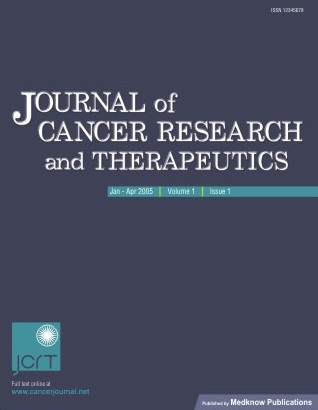
|
Journal of Cancer Research and Therapeutics
Medknow Publications on behalf of the Association of Radiation Oncologists of India (AROI)
ISSN: 0973-1482 EISSN: 1998-4138
Vol. 6, Num. 4, 2010, pp. 595-596
|
Journal of Cancer Research and Therapeutics, Vol. 6, No. 4, October-December, 2010, pp. 595-596
Interview
An interview with Dr. Shelley Hukku, The new president of AROI
Sapna Gupta
Consulting Radiation Oncologist, D59/142 A-13-1, Sant Raghuvar Nagar Colony, Sigra,Varanasi, India
Correspondence Address: Sapna Gupta,
Consulting Radiation Oncologist, D59/142 A-13-1, Sant Raghuvar Nagar Colony, Sigra,Varanasi,
India,
drsapna18@yahoo.co.in
Code Number: cr10152
S.G.: Congratulations on being elected as the President of AROI for the next 2 years. Reaching this goal I am sure is the beginning of a new journey. What are your plans for this new journey? S.H.: It is indeed a milestone for a member like me who joined the association as a founder member in 1978. At that time, I was just a few months old in the field of radiotherapy and was a junior resident at PGI, Chandigarh. Radiotherapy was in its infancy in India and nobody could realize that in three decades we will equal any other country in terms of technology. As the President of this association, I have chalked out the future plans which will take AROI to new horizons in patient care, technology and training, clinical trials, consensus guidelines, liaison with the government and regulatory authorities and many more areas. S.G: What are the areas in which AROI should give emphasis? SH: We have achieved a lot in terms of providing service to our patients through modern techniques such as 3DCRT, IMRT and IGRT. But we are lagging behind in epidemiology, clinical trials and research. Presently, the cancer statistics is available to us through ICMR cancer registries which represent a small part of our population. I want AROI to launch its own registry so that we have an authentic data through our members working all over the country. This will provide us information on the types of cancer, incidence of various types of cancers, stages at presentation, use of radiotherapy and chemotherapy in our patients and many other parameters on which future planning of facilities can be done. S.G.: Should we persuade the government to include the views of AROI in all its national programs related to cancer? S.H.: With the broad experience which radiation oncologists have, we are in the best position to guide the government on policies toward cancer control, creation of new facilities, formulating regulatory guidelines and devising curriculum for oncology at undergraduate levels. My endeavor will be to approach Ministry of Health, Government of India, to have permanent representatives from the association in its committees, AERB to have AROI representation in Sarkar committee, and MCI and National Board to have representatives from the association. The aim is that the association′s voice should be heard when policies are made in India. S.G.: What are your plans for promoting multicentric trials? S.H.: There is a need to conduct clinical trials in order to analyze the results of our work. We have a large clinical material, which if looked into systematically, can give answers to our problems and guide the world on diseases like head and neck cancer and cervical cancer. The only way to go ahead is through multicentric trials and I think that AROI is in a very good position to launch these trials. In the next two years, I will see that a few trials are underway. S.G.: Should AROI evolve a code of conduct for radiation oncologists, medical physicists and technicians? S.H: Yes. In the modern times, it is very essential as many areas of work are overlapping. We have to realize that all these three groups are dependent on each other for successful implementation of their practice. I will try to look into all these important areas for smooth functioning of the specialty. S.G.: Do you think there is a need for greater connectivity between radiation oncologists from different parts of India on a continuous basis? S.H.: Good and regular communication is the key to success. Unfortunately, we are lagging in this most important virtue. There is a need for this connectivity so that we can learn from each other′s successes and failures. This will also give an opportunity for our students to interact with persons outside their departments and this will increase brotherhood and and broaden the outlook of young radiation oncologists. S.G.: Any thought on how AROI can help promote research and how we can integrate the industry into this? S.H.: Research is important for progress in any field but it demands resources and dedication. Private sector gives more emphasis on service and not on research due to obvious reasons, and government institutions, except a few, do not have financial resources to fund research. Clinical research is possible through trials but for basic research we need to have financial support. This is an area where we can have a strategic partnership with the industry. We should engage industry to adopt departments so that we can focus on basic research which will benefit both the groups equally. The relationship with the industry is a taboo in our environment but we should break this image and develop a mutually beneficial relationship with them like in western countries where big departmental programs are funded by the industry. S.G: Do you see any other role for industry to participate in AROI? SH: I would also like the industry to take a lead in teaching and training manpower, which is very essential for an exponential growth which we are experiencing now. In order to use it to its maximum, AROI should work together with AMPI and Radiotherapy Technologists Association. S.G: Any other comments? In the end I would say: Coming together is a beginning Keeping together is progress Working together is success. So, let us work together. Nothing is impossible. Just try a bit harder.
Copyright 2010 - Journal of Cancer Research and Therapeutics
| 